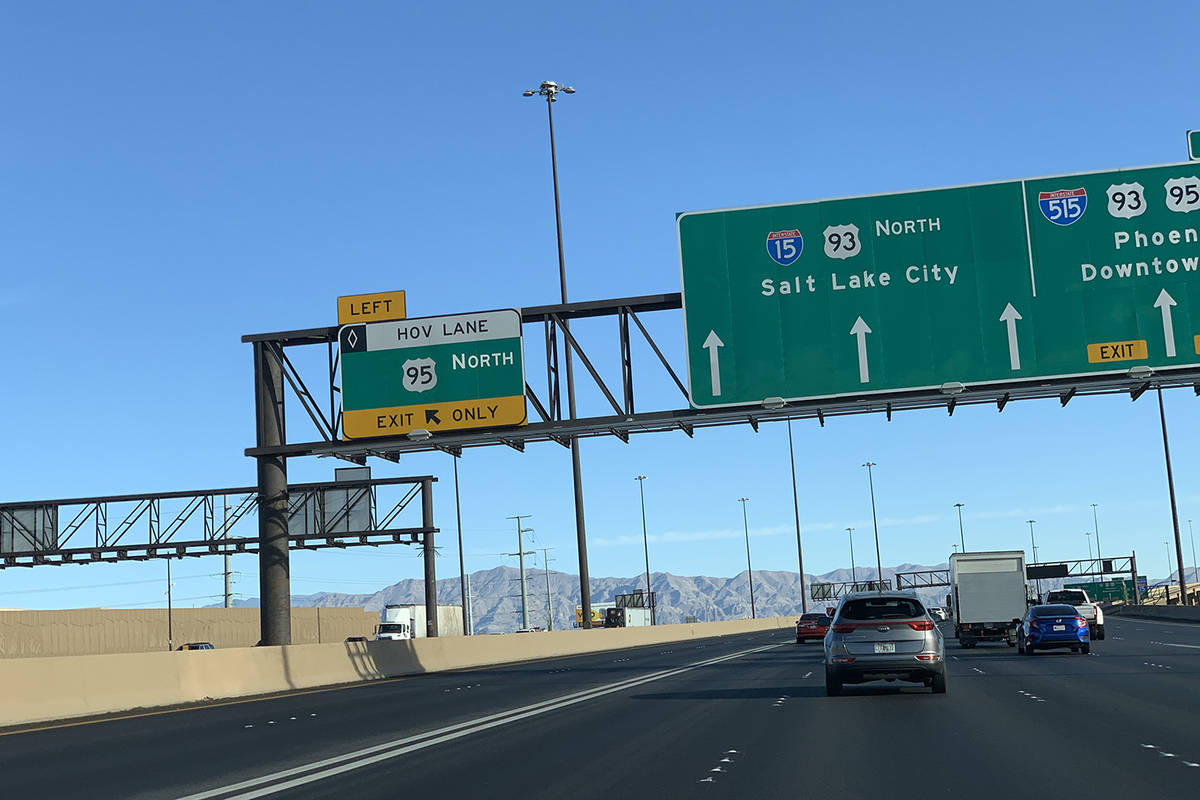Changes coming to HOV lanes in Las Vegas Valley

After nearly a year of motorist complaints about the high occupancy lane system that went live in 2019, changes are on the way.
Crews are set to begin restriping the HOV lanes along Interstate 15 and U.S. Highway 95 on May 4, creating additional carpool entrance and exit points, the Nevada Department of Transportation announced Friday.
Las Vegas Review-Journal readers like Don Stewart have wondered what was up with plans to add new entry/exit points.
“We’re not on the road all that much now, but we did need to drive both south and then north on 15 yesterday to retrieve someone from the airport,” Stewart said in an email to the Road Warrior. “If I recall, new entry/exit points from both north and south bound HOV lines were to be added this spring. But I saw no evidence of any action on that. Any idea about the status of the remarking?”
The 22-mile HOV system was added as part of the nearly $1 billion Project Neon. The system runs from Silverado Ranch Boulevard on I-15 in the south to Elkhorn Drive on U.S. 95 in the northwest valley.
Since its inception, motorists have complained loudly about the system — mainly about its 24-hour nature and the lack of entry and exit points.
At a December meeting, NDOT Director Kristina Swallow noted the complaints and acknowledged the lack of entry and exit points was an issue.
“Since we have opened the system, we have heard from the community about where the system is working and where it’s not,” Swallow said. “One of the critical complaints that we received is … on I-15. From what I understand if you get on at Flamingo, Spring Mountain, Sahara and you’re going north, you cannot access the HOV lanes until all the way at 95 at Decatur. That’s not what we intended; that’s a problem.”
The new entry/exit points will be added after the restriping efforts are completed.
A new access point is being added along I-15 northbound, just south of Sahara Avenue, with another between Sahara Avenue and Charleston Boulevard. Meanwhile, I-15 southbound will get another access point, just south of Sahara, with another just south of the 215 Beltway.
U.S. 95 northbound will get another access point between the Spaghetti Bowl interchange and Martin Luther King Boulevard, with two more access points at Craig Road — one for northbound traffic and another for southbound motorists.
The first portion of the restriping efforts will take place during three overnights next week, leading to temporary lane closures. New sign installation is also part of the work planned.
Here’s the schedule of lane closures:
May 4-5: The I-15 northbound HOV flyover to U.S. 95 northbound will be closed from 6 p.m. May 4 until 4 a.m. May 5. The HOV and inside travel lane will be closed along northbound U.S. 95 at Rancho Drive.
May 5-6: The HOV and inside travel lane along U.S. 95 northbound between Alexander and Lone Mountain roads will be closed from 6 p.m. May 5 until 4 a.m. May 6.
May 6-7: The HOV and inside travel lane along U.S. 95 southbound between Ann and Lone Mountain roads will be closed from 6 p.m. May 6 until 4 a.m. May 7.
Additional overnight closures will come at a later date to carry out other restriping work tied to the HOV system.
Work on the freeways comes as traffic volume is down across the Las Vegas Valley following the stay-at-home orders issued by the state last month.
Bridges rated No. 1
If you’re traveling across Nevada, you can rest easy knowing the state’s bridges were ranked as the nation’s best.
The state has earned the top spot in six out of the past seven years, narrowly missing out on the honor last year.
The ranking comes from the American Road and Transportation Builders Association’s analysis of the country’s bridges, which was released last week. The list is based off of the U.S. Department of Transportation’s bridge inventory data.
Data showed only 1.3 percent of Nevada’s 2,029 public bridges are structurally deficient, tying with Texas for the top spot. Nevada is significantly lower than the nation average of 7.5 percent.
The term structurally deficient describes a bridge in need of some rehabilitation or potential replacement; it doesn’t necessarily mean it’s unsafe or dangerous.
“Our focus is keeping everyone safe and connected on Nevada’s roads and bridges,” NDOT Director Kristina Swallow said. “Federal and state transportation funds are critical to ensuring Nevada bridges are kept up as a part of that safe and connected transportation system.”
Department crews inspect all bridges statewide, including city and county-maintained structures, every two years, regardless of condition.
“However, bridges with extensive deterioration are inspected more often,” said Tony Illia, NDOT spokesman.
Around 475, or about one-quarter, of state-owned bridges are over 50 years old, the age when rehabilitation is typically needed to maintain fair condition.
“Nevada’s high bridge rating is the result of continued reinvestment into regular maintenance and upkeep that avoids severe deterioration and costly repairs,” Illia said. “Additionally, Nevada benefits from a relatively small inventory of still mostly new structures as well as a warm dry climate that forgoes the corrosive freeze-thaw cycle found in more extreme wet weather states.”
Send questions and comments to roadwarrior@reviewjournal.com. Please include your phone number. Contact Mick Akers at makers@reviewjournal.com or 702-387-2920. Follow @mickakers on Twitter.